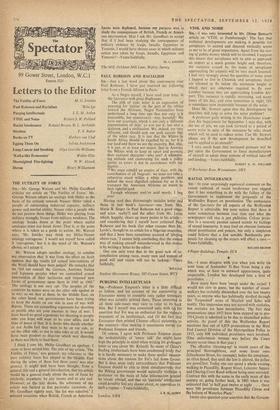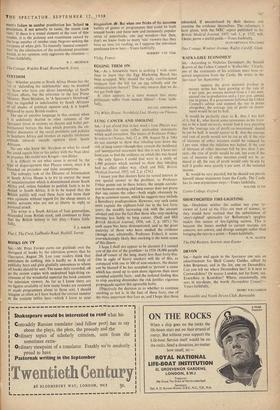SIR,—I must disagree with you when you write (in your
issue of September 5) that 'from being a city which was, at least to outward appearances, quite respectable, London has developed into a hive of prostitutes. . .
How many have been 'swept under the carpet' I would not care to guess, but the number of street- walkers has certainly diminished over the last twenty years, as anyone who has habitually strolled through the 'frequented' areas of Mayfair and Soho will testify. This impression may not accord with statistics, but statistics are here inconclusive. The fact that prosecutions since 1952 have been stepped up to pre- 1914Jeveli is admitted to be due to intensified police activity. As proof of this the Wolfenden Report mentions that out of 6,829 prosecutions in the West End Central Division of the Metropolitan Police in 1953, only 808 individual prostitutes were involved. (One unfortunate woman was before the Court twenty-seven times in that year.)
The effective 'cleaning-up' in recent years of the principal thoroughfares, and some lesser ones (Glasshouse Street, for example), belies the complaint, so often heard, that until the law is altered, the police are powirless. Today one can spend a whole evening walking in Piccadilly, Regent Street, Leicester Square and Charing Cross Road without being once accosted. Contrast this with the scene in the early years of this century or, going farther back, in 1881 when it was estimated that 'at half past twelve at night . . . there were 500 prostitutes between Piccadilly Circus and the bottom of Waterloo Place.'
Iimust also question your assertion that the Govern- rnent's failure to combat prostitution has 'helped ea precipitate, if not actually to cause, the recent race riots.' If there is a sexual element at the root of this trouble, it is the jealousy and resentment caused by the large number of surplus male Negroes seeking the company of white girls. To intensify 'natural competi- tion' by the elimination of the professional prostitute would, in my opinion, only aggravate the situation.— Yours faithfully, R. L. ARCHDALE The Cottage, Walden Road, Hornchurch, Essex STRYDOM



































 Previous page
Previous page